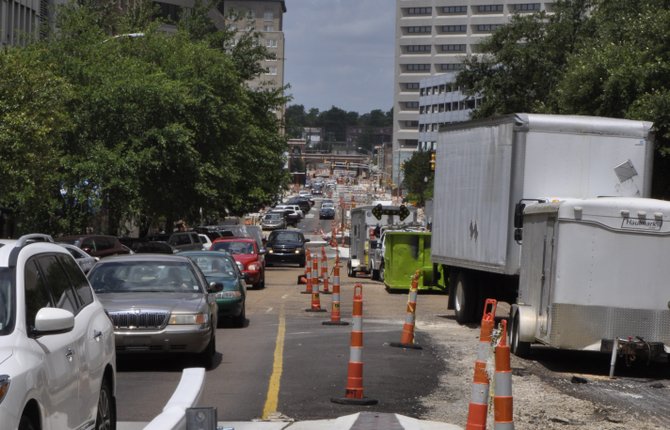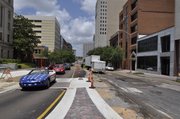Capitol Street is on its way to becoming a two-way street, but Downtown Jackson Partners is seeking additional funding—and access to the mayor—to finish rebuilding portions of the street as planned. Photo by Trip Burns.
A plan to beautify and two-way a portion of Capitol Street downtown is a little more than half finished, but its completion may be threatened if the project does not get a jolt of cash.
Without that funding, the entire strip from State to Gallatin streets will be two-way as of March 2015, but half the strip, from Lamar east to State could be left without repaving, roundabouts and other beautification elements.
Originally, the plans for the street called for enough money to resurface the road, widen the sidewalks, and install new lighting and changes to the intersections—not funding for deep infrastructure repair, said John Gomez, associate director at Downtown Jackson Partners. He also said the engineers who were consulted on the status of Capitol Street's water and sewer pipes assured the city that the pipes were still in proper condition.
However, pipes under the street burst unexpectedly in 2012.
Up to the City
The project has cost roughly $9.2 million thus far, including a $2 million grant from the Mississippi Development Authority, as well as $3.5 million in federal earmarks, which required a 20-percent match from the city. Eutaw Construction is the contractor for the project, and Neel-Schaffer is provides engineering.
Now, Capitol Street boosters hope for additional funding in order to shape the project the way it was originally planned, which included rebuilding the portion of Capitol Street from Lamar to State streets.
"It won't be complete like we want it to be until we get additional funds for the project," Gomez said.
A two-way street would slow down traffic and encourage more people to get out of their cars and shop. Gomez says that although the city plans to finish up with the current renovations between Gallatin and Lamar streets, the city will decide how the project ultimately plays out for the rest of the street leading to State Street, which is why there is no current date set for the street's completion.
The economic development and public works departments are aware of DJP's interest in rebuilding the rest of the street, Gomez says; however, a formal meeting with Mayor Tony Yarber has yet to happen as of press time.
Jackson Ward 1 Councilman Quentin Whitwell told the Jackson Free Press that the city is currently in communication with Gov. Phil Bryant to see about additional assistance, possibly economic-development highway funds, in order to complete the project as a whole.
Progress between Gallatin and Lamar stalled for the first two weeks of June due to damp weather conditions. The south side of that stretch still needs several layers of asphalt, which will be finished when the weather permits.
Workers are now widening the sidewalks and taking down the last of the old entrance and exit ramp on Capitol Street leading to the Jackson Place parking garage. A new ramp to the garage has been built on the Farish Street side of the building. Space is also being left along the street for new light posts, trees and bushes later on.
Round and Round We Go
Construction is almost finished on the new roundabouts, which requires a few more layers of pavement and brickwork before completion. "They add some character and place-making features to the street," Gomez explained.
He said the roundabouts would not be an obstacle for emergency vehicles or parades.
"After they finish putting on a couple more layers of asphalt, emergency vehicles and larger trucks will be able to drive over the roundabouts if they need to. They are made to be able to drive over for parades and festivals, since Capitol Street is used for several events, from St. Patty's Parade to the holiday parades."
Mukesh Kumar, interim program director of the Urban and Regional Planning Department at Jackson State University, disagreed that emergency vehicles will be able to drive over the roundabouts, saying that it defeats the entire purpose of having roundabouts.
He explained that although the roundabouts slow down traffic and enhance the aesthetics for the area, the roundabouts may also cause issues for pedestrians and cyclists.
"If the whole idea is to have a street that is more pedestrian and bike friendly, roundabouts cause a very serious problem because with roundabouts, it becomes a barrier for both cyclists and pedestrians."
"As a pedestrian ... I need to be able to predict where the traffic is going. The question is—as a human being, can I predict a straight-line movement better or a curve better? If I'm crossing traffic, and I see a car coming around a circle, typically there is a higher level of uncertainty as compared to a straight line, where by I know I can gage what the speed of the traffic is, and I can make my judgment accordingly."
Why the Pipes Burst
City traffic engineer Robert Lee said that the most notable pipe problem was related to a sewer failure under Lamar Street. He said the pipe under the street had "well outlived its projected life-span." With the accumulation of gasses in the clay pipes, it was only a matter of time before the pipes burst.
When that happened, the city gave the project part of a $6-million bond reserved for water and sewer emergencies; however, the city did not seek additional funding for the water and sewer issues. Even with help from the bond, the city had to dip into the original funding to go toward repairing the pipes. Water and sewer renovations under the section from Lamar to Gallatin streets were completed in the spring of 2013.
Due to the unexpected repairs, project planners agreed to move forward with the project but will rebuild only half of the eastern side of Capitol Street, from Gallatin to Lamar streets. Construction began back in July 2013.
They plan to repaint the span between Gallatin and State streets for two-waying by March 2015 and hope to have the funding to reconstruct the portion of the road between Lamar and State streets sometime after.
Shelia Byrd, City Hall communications director, declined to make city officials available for interviews.
Whitwell said that although the pipe breakage of 2012 was due to the city's incorrect assessment prior to beginning the project, the city is still focused on moving ahead with the project as well as finding additional funds to complete the project the way it was originally designed.
"Obviously, somebody was wrong," Whitwell said. "Our infrastructure is very unstable, and that's why we're doing what we're doing right now. My belief is someone, whoever it was from the city that made that assessment, was incorrect. I don't know that there was any way that they could have foreseen what happened. What we have to do is pick up the pieces where we can. The fact of the matter is this: The project has been cut in half. It's going to look good, but it's not going to be the whole deal."
Business in the Balance
Businesses along Capitol Street are also experiencing stress from construction. With fences blocking off major portions of the street and piles of dirt and gravel along the middle of the street, businesses find that many of their potential customers are choosing not to hassle with finding free parking or pay for parking in a garage.
There are plans for more parking spaces and new meters along Capitol Street once the work is completed. However, construction areas along the street currently do not allow for much parking, apart from a few parking areas across from the Governor's Mansion and along the southern end of the street near the King Edward Hotel.
Lina Lynn, owner of Wasabi Sushi and Bar, says her business sales have dropped roughly 40 percent since construction along the street began.
"Even at lunchtime, the people who work downtown that are within walking distance, with all of this mud and stuff on the roads, they don't want to walk down it," Lynn said. "At nighttime, we're basically dead. There are no streetlights, and it's so dark. ... Our customers can't find parking on the street, and they've started charging upstairs in the parking garage. We've lost a lot of business."
While Wasabi's business sales have been cut almost in half, some businesses that were already struggling before construction tell the Jackson Free Press that their revenue is now almost nonexistent.
Lamia Dabit, owner of Lamia's Boutique Accessories and Formals, has owned her shop on Capitol Street for 30 years. She explained that her business has never been worse, saying her business has gone down a staggering 90 percent since construction began. Fashion Corner, a men's clothing store, is her family's other business located just two doors down. Dabit said Fashion Corner's business has also dropped 75 percent.
Dabit explained that before construction, their businesses were doing "OK," but now the family to borrow money from the bank just to pay the utility bills. She has been trying to close the store for almost a year and a half.
"Since the economy went down, business went down, but the construction killed the rest of the business," Dabit said. "... I don't know what they expect us to do," Dabit said. "Just sit and wait and borrow more money from the bank to cover our bills? ...I don't think things will get better for the next two or three years. No way."
Both Lynn and Dabit say that loading goods outside their businesses have been a huge issue as well. Lynn said that services have refused to deliver to the restaurant because of the construction, and now she is forced to pick up her deliveries from a different location.
For the western portion of Capitol Street past Gallatin, Ward 4 Councilman De'Keither Stamps said recently that he hopes to improve the corridors leading to the Jackson Zoo by marketing the zoo along the street.
"I want to change Capitol Street so that you see some lions and tigers and bears," Stamps said. In addition, he envisions installing green spaces in some of the vacant lots that can be seen from Capitol and other thoroughfares that "would change the whole demeanor of the zoo."




Comments